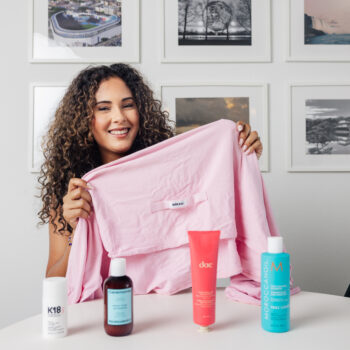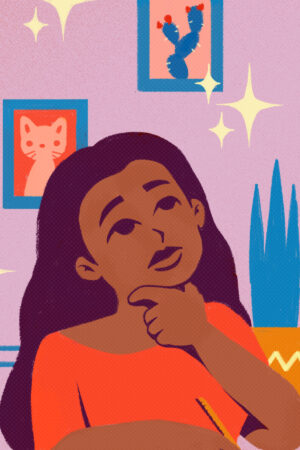Gissel Alvarez has always known she belonged in the music space. Perhaps that’s why the digital marketing specialist is confident about her place in an ever-changing musical landscape and why she’s dedicated to being at the forefront of digital strategies that ensure music reaches a broader audience.
Alvarez’s journey began interning at Emmis Communications for Hot 97, WBLS, and WLIB. She worked in a rotational program, where she tried out different departments every two weeks. “When I got to the digital department, I knew I found my calling in digital marketing. If I could engage on social media daily, why not do it professionally for music?”
That’s because music, in general, has always been a part of Alvarez. “I have been singing and playing the alto sax since childhood,” she says with a laugh. “You couldn’t tell me I wasn’t going to be performing on BET’s 106 & Park.” And music has taken her far — but in different ways: From working as a Digital Editorial Content Manager for BeyGOOD, a Global Social + Editorial Lead for Twitter Music, and as a Social Media Producer & Sr. Lead for Tentpoles + Live Specials for BET Networks.
All of this led her to become the digital editorial content manager for Beyoncé’s Renaissance World Tour, a moment Alvarez calls “an experience of a lifetime that honed in the importance of community.” To this day, she says, “Seeing my name on the tour credits still gives me chills.”
We sat down with Gissel Alvarez to discuss how the little girl from Brooklyn with big dreams got to where she is, the mentors that brought her here, and the legacy she hopes to leave in the music industry.
This interview has been edited and condensed for clarity.

When was that one moment or turning point in which you felt you were in the right space?
I felt that way when I got to BET. I started as an intern, was hired as a coordinator, and then became a producer for the digital department. So, I got to cover all facets of music, and they embraced that. But I felt like myself at my core being onsite at an award show. It was a social media influencer-based award show, and I went, “Oh my God, this is so cool.” When I was younger, I always told myself, “I don’t know how I’m getting to any of the award shows at BET or BET Awards, but I’m going to get there.” So when I was on set for that moment, I went, “Okay, I’m here. I have to continue this.”
Another BET moment was when I produced my first piece called Bounce Etiquette with Big Freedia. Big Freedia taught the BET staff members how to dance to bounce music. With the help of my team, everybody came together to help me bring this project to life. It went viral on Twitter when it was posted, and I said, “Oh my God, everybody’s excited with me.” And it’s that initial feeling where you go, “Yes, I did that. Can’t nobody tell me anything.” That’s when it feels good, and you want to keep going.
So often, we see people advancing in their careers or making “big moves” on social media, but it’s rare we hear or see those introspective moments in which a person considers quitting or transitioning. Did you ever have a moment like that?
I haven’t felt compelled to quit or transition out, but our paths aren’t linear, and I’ve experienced feeling defeated. We all have at some point, especially within entertainment. It becomes a lot. But in those moments, I try to remind myself of what is my why. We all have a purpose, and when you try to remember that, whether work-wise or in real life, we must remember who we are and what we represent at our core. I always know that my purpose within the industry is to make sure that I represent and support the communities that I’m part of and just everything I love in general.
Were there any mentors or other women who inspired or helped you get to where you are now?
The women in my family—my mom, Miguelina, and my aunts Luisa, Yuderca, and Gloria—are such hard workers. Even though they aren’t in entertainment, they’re the epitome of hustlers. On top of that, they think outside the box. And that’s important because they helped me just be me, especially creatively. That helped me grow.
I have to mention Evelyn Mangin because she helped me start my internship journey. I’m forever grateful to her because that kickstarted my career in music. And then my bosses, Victoria Fleary, TJ Barber from BET, and then Ashley Tyra at Twitter. They nurtured me and my creativity. And having folks within the industry, especially women, gives you the space to be eccentric. I’m forever grateful because I don’t know if I would’ve grown as a professional or a creative without them giving me the space to be myself.
What’s one of the biggest hardships you’ve faced as a woman — or even as a Latina — in the music industry?
Sadly, it’s being typecasted and undermined by other women. I vividly remember the early stages of my career when I was told that I needed to be seen and not heard. But one thing for sure is that I didn’t let it stop me. This is entertainment. This is music. If anything, you need to be heard… all the time, 24/7. You need to represent those you’re representing, but you also need to be a voice for those who don’t have one. So, I continue being exactly who I am: a very boisterous, loud Dominican woman from Brooklyn. And nobody can tell me different.
I continue being exactly who I am: a very boisterous, loud Dominican woman from Brooklyn. And nobody can tell me different.
What’s one of your favorite parts of where you are now in your journey?
Being comfortable with who I am and practicing the power of walking away when you need to. That’s important because, yes, the economy is horrible, but my mental health is more important. My mental health and my respect are more important than anything. Time and time again, we all come across certain matters that you ask, “Where do I fall in this? Am I going to feel good in the long run?” Sometimes, we’re in a situation that could be the best career move ever, but if it’s not serving you or you’re not being respected, bounce. One thing’s for certain: I respect myself more than anything. So, if I need to walk out, I will walk out with my head high and move on.
We’re seeing more and more women artists and music creatives speak out about how their work went unprotected or their trust was abused in the industry — what has been your perspective on this, if any? Is this something you’ve seen happen?
I’ve seen it happen on multiple occasions, especially when they steal each other’s art. It’s rude. It’s tacky. But most importantly, it’s about showing appreciation instead of stealing something. Show the originator love or work with them. Simply work with them, hire them. It’s very disrespectful to see someone’s work replicated and then get more notoriety than the originator. We see this every day, whether it is digital marketing, TV shows, award shows, or music. If we don’t protect each other and help one another out, then it’s going to continue to happen.

What can be done to make the music industry feel more safe and collective for women?
Voicing when you see something when you aren’t aligned with how someone is being treated. It’s very taboo for certain people or old-school folks to speak up. But that needs to stop because how are we supposed to grow, especially as women within the industry, if we’re not standing up for one another and not saying, “Hey, that’s not cool.” We have to nip it in the bud right away. There’s no room to be quiet anymore at all. Everybody needs to speak up and be sure that they stay true to who they are, but also make it clear that I’m not the one.
How are we supposed to grow, especially as women within the industry, if we’re not standing up for one another?
But it’s not just men; women can also affect each other’s journey or success. Can you explain why a crabs in a barrel mentality — “If I can’t have it, neither can you” — is harmful to women?
I’ve experienced so much from the early start of my career. Even as late as last year. It’s insecurity as a whole and then job security. And I genuinely do feel bad for the women who treat other women horribly because, one, that could be learned behavior, but two, it’s something that most likely happened to them. And I hope that they can grow from it.
It’s such a narrow-minded way of thinking and leading or lack thereof when it comes to leadership that they try to dim your light as much as possible. And for me, I’m not going to take that. We’re going to talk this out even if you still end up treating me that way. At least I stood up for myself, or I stood up for another woman that I saw being mistreated. But I’m not going to stay quiet.
What do you hope to personally change about the music industry, especially for the next generation of women in this space?
Legacy-wise, as a whole, I want folks to remember me. For me, at my core, being charismatic, loving, nurturing, and always focused on community within the music industry. Putting people on, giving people a chance. New women, artists, and folks that I believe in. I feel like there’s room for all of us. And my goal is to always make sure that I extend a helping hand. But if I can’t help you out with something, I’m going direct you and go, “Look at my girl over here. She could help you out.” I love building community and adding to it.
Another thing I want to make sure is that there’s more Afro-Latina representation. It’s very rare. I’ll give it that there’s more representation, but there could be a lot more. At the end of the day, I’m a Black Latina, and I always let it be known. And I want to do my part to ensure we are represented as much as possible.








